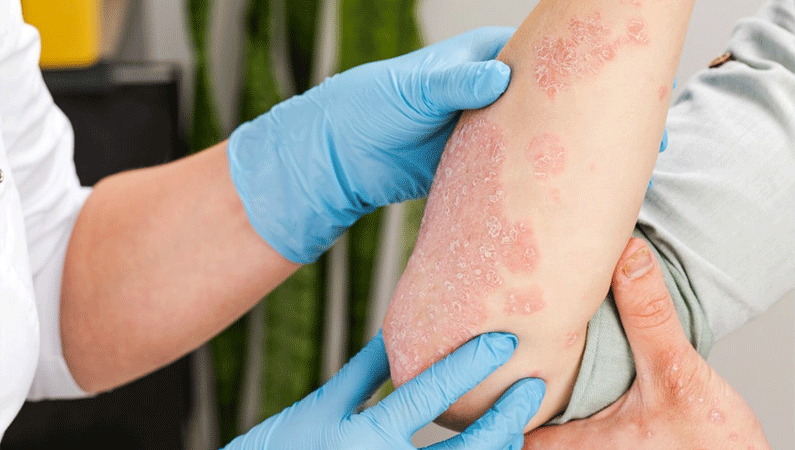
Psoriasis is a common chronic skin condition in which the body shows symptoms like raised plaques, inflammation, and white scales. It is usually seen in young people. It is typically a result of hyper-immunity of the body and does not have any cure. According to the studies, the prevalence of Psoriasis in India is 0.44-2.8 %.
Psoriasis sometimes leads to other complications, and it is wise to consult a dermatologist about your condition. Dr. Manisha Saney is a renowned dermatologist and has excellent expertise in Psoriasis treatment. Let us know more about the cause, symptoms, and treatment of Psoriasis.
cells. Usually, a skin cell takes around one month to grow and die. But in the case of Psoriasis, the skin cells mature in just a few days. Imagine the cells developing fast and not falling off. This mechanism will create a build-up of skin cells on the affected area of the skin. This build-up results in white scales, plaques, inflammation in your body. The symptoms of Psoriasis are mainly seen on the hands, feet, neck, scalp, nails, mouth, face, and genital areas. Genetics is also a factor of cause of Psoriasis. Psoriasis can be the side effect of diabetics, inflammatory bowel diseases (IBD), heart disorders, Psoriasis arthritis, anxiety, and depression.
The symptoms of Psoriasis are not stable. It might go severe for a few months and then diminish a bit. Primary symptoms of Psoriasis include:
Psoriasis can not be completely cured, but the risk and symptoms can be reduced using specific treatments. Psoriasis can be diagnosed by physical examination and biopsy. If a physical exam does not confirm your condition, Dr.Shaney will take a small section of your skin for a detailed analysis.
Once the type of Psoriasis is identified, the doctor will start the treatment procedures. She might prescribe you topical creams or ointments, oral medications, etc. If required, the doctor will suggest you have light therapy. In light therapy, the doctor will use light beams to reduce the symptoms of Psoriasis.